What science says about veganism for athletes
‘Weak like a vegan’? What evidence says about veganism for athletes may surprise you
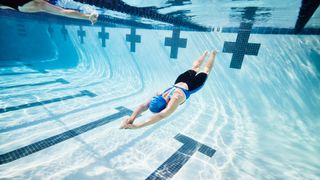
You’ve probably heard countless stereotypes about vegan athletes. Maybe you’re even convinced that there’s a grain of truth to some of these beliefs. But what science says about veganism and exercise may surprise you. And with a growing interest in environmentally-friendly lifestyles, it’s more important than ever to bust the myths that surround vegan athletes.
So what exactly is veganism? According to the Vegan Society, veganism is ‘a philosophy and way of living which seeks to exclude – as far as is possible and practicable – all forms of exploitation of, and cruelty to, animals for food, clothing or any other purpose’. As such, a vegan diet completely cut out meat, dairy and eggs, but they also don’t allow foods that use animal derivatives, such as honey, shellac or bee pollen.
Understandably, many may doubt whether such a restrictive way of eating can help athletes to step up their fitness game. Here, we’ll dive into some common misconceptions about training on a plant-based diet and look at some of the potential benefits of veganism for athletes. We will also provide useful tips on how to achieve peak performance if you do follow a plant-based diet.
Veganism for athletes: common myths
There are so many myths doing the rounds about veganism for athletes, so let's have a look at some of the most common.
Myth #1: ‘Vegans are malnourished and get ill a lot’
One of the biggest myths about plant-based diets is that they lack many important nutrients and may subsequently lead to malnutrition. However, evidence suggests this isn’t the case.
According to a study published in Nutrition Reviews, vegan diets tend to consistently rate higher than others in terms of their quality and nutritional value. They may also provide many health benefits. Multiple studies, reviewed in Current Nutrition Reports, have reported that plant-based diets can reduce the risk of developing several different types of cancer. They can also boost longevity and protect against cardiovascular problems, as demonstrated in a recent meta-analysis in Frontiers in Cardiovascular Medicine. So as long as you follow a well-balanced diet, there’s no need to worry.
Myth #2: ‘Vegans can’t get enough protein’
“But where do you get your protein from?” If you’re a vegan (or have considered becoming one), it’s almost a given that you’ve been asked this question. There’s a strong belief that animal-based products are the only good sources of protein, but in reality, this isn’t the case. Indeed, meat, dairy and eggs provide a great deal of this important macronutrient, but so do beans, lentils, nuts, seeds, soy-based products (such as tofu and tempeh), spirulina and many types of grains. Even certain vegetables, such as broccoli, asparagus, leafy greens and sprouts will top up your protein intake.
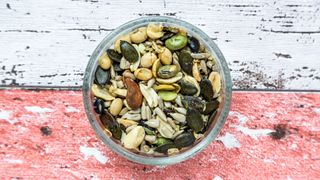
Myth #3: ‘Vegans suffer from low energy levels’
A common stereotype is a lethargic, weak vegan who can’t get through the day without taking a nap. While a myth, it could be true in certain cases. Plant-based diets that are balanced and contain all necessary nutrients will not lead to excessive fatigue. However, if you’re deficient in vitamin B12 and iodine – which are found mostly in animal-based foods – you may experience a drop in your energy levels.
That’s why it’s important for vegans to make sure that their diet and supplements provide enough of these micronutrients. It’s also worth mentioning that many people experience exhaustion during the first few weeks of transitioning to a vegan diet. It’s perfectly normal, and once the body gets used to a new diet, the feelings of tiredness pass.
- Related: How does protein give you energy?
Myth #4: ‘All vegan diets are healthy and promote weight loss’
Is a vegan diet healthy? If done right, plant-based diets can be extremely beneficial for athletes. But with the abundance of vegan processed foods available on the market these days, it’s quite easy to make the wrong choices. If your entire diet is based on foods rich in fats, sugars and starchy carbohydrates, you’ll not reap any health benefits. Similarly, plant-based foods can be great for weight loss as they tend to have more dietary fiber and a lower calorie density. Still, if you’re continuously eating more calories than you burn, even the healthiest meal plan can make you put on a few pounds.
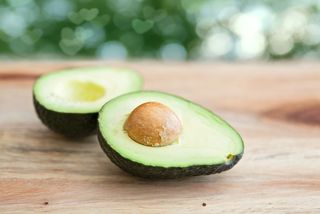
Myth #5: ‘Vegan diets will slow down your recovery’
Recovery is an essential part of every training program. This is when your torn and exhausted muscles rebuild themselves to get bigger and stronger. When your body is nourished properly, your muscle soreness should get better after a day or two of rest.
A well-rounded vegan diet may actually speed up your recovery, because of the high level of anti-inflammatory compounds found in plant foods. Phytonutrients like antioxidants may help to lower the burning sensation in your muscles and get you back on track sooner. For competitive athletes, a quick recovery means more time spent training, and ultimately, better end results.
Potential benefits of a vegan diet for athletes
There are definitely benefits to be had for those athletes who decide to go vegan. Here are a few perks that going vegan can offer you.
Body composition
The ability to grow and maintain muscles is the cornerstone of many different types of sports. It’s even more important for competitive bodybuilders, because how they look and present themselves is crucial to their success on stage.
“One of the biggest misconceptions surrounding vegan diets is the belief that plant-based foods can't provide enough protein to build any muscle,” says Liam Holmes, performance nutritionist, Foodspring ambassador and owner of pH Nutrition. “Most meat-eaters argue that protein from animal sources contains all the essential amino acids needed for muscle development, and therefore it is of higher quality than plant protein.”

So is it possible to build muscle on a vegan diet? “The answer is: ‘absolutely’,” says Holmes. “More and more studies are now showing that you can build muscle on any diet that gives you enough protein, paired with resistance exercise. All whole plant foods have protein and by mixing different foods together you can get a complete source of essential amino acids that make up protein.”
And available evidence seems to confirm this. Results from a recent meta-analysis of randomized controlled trials published in Nutrients, indicate that protein source does not affect changes in muscle mass or muscle strength. However, it may influence the percentage of lean muscle mass in relation to the fat mass, especially in younger adults.
Lastly, most athletes rely on protein supplements to fuel up their workouts. The best vegan protein powder, protein bars and snacks may be more beneficial for those who suffer from gastrointestinal issues or are sensitive to dairy, which is the main protein source in many animal-based products. Plant protein may even be better for our gut health, as indicated in Frontiers in Nutrition.
Endurance training
Intensive aerobic training comes with a unique set of challenges and difficulties. If done to a reasonable level, it can be highly beneficial for metabolic, cardiovascular and mental health. However, studies suggest that competitive runners, swimmers and cyclists are at higher risk of developing atherosclerosis (narrowing of the arteries due to a buildup of cholesterol) and inflicting damage to their heart muscles. They also need to closely watch their diet to keep their energy levels high.
According to a comprehensive review published in Nutrients, plant-based diets have a wide-ranging impact on cardiovascular efficiency and energy metabolism.
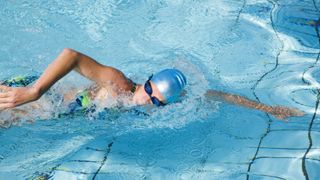
“The vegan diet is associated with an increased carbohydrate consumption which can be seen, in some sports, to benefit performance,” says Jess Hillard, nutritionist at Warrior. “This also comes with high fiber, which can be seen to provide volume to the diet and increase satiety for the athlete, which can help with sports that require lower body weight and ensure athletes stay satisfied after meals. This also accompanies research which has found that vegan diets are associated with lower fat mass, specifically seen in runners.”
What’s more, plant-based diets can help to lower blood pressure and improve blood flow by improving the arterial flexibility and the internal lining of vessels. At the same time, they may significantly decrease the blood lipids and cholesterol levels. As a result, vegan diets can help reverse atherosclerotic changes and boost the flow of oxygen to the heart muscle.
A study published in Diagnostics also suggested that a plant-based diet has a direct impact on VO2max (a measurement of aerobic capacity), as well as the structure and functioning of the heart.
Strength training
Two factors will dictate how much you can lift, push or pull: how much heavy resistance training you do and how good your diet is. Your food choices will impact the size of your muscle fibers and the ability of your nerves to activate them.
According to a review published in Nutrients, research studies haven’t been able to demonstrate consistent differences in strength performance between vegan and omnivorous diets. Interestingly, on many occasions, it was plant-based diets that achieved better results.
In another study, also published in Nutrients, crossfit-trained participants went on a vegan diet for four weeks and had their exercise performance measured throughout the intervention. A control group was following a mixed, omnivorous diet during the same time period. The study has found no significant differences in performance between these groups, with the exception of the vegan group achieving better results at a strength endurance test.
Similarly, a study published in the European Journal of Clinical Nutrition compared the strength of vegan and omnivorous young women by measuring their leg and chest press. Vegans were as strong as those eating an animal-based diet.
Lastly, strength training may involve a lot of muscle and joint inflammation. Jessie Jones, nutrition coach at OriGym Centre of Excellence, points to the anti-inflammatory properties of a vegan diet.
“There’s a strong link between meat consumption and inflammation,” she says. “In athletes this can cause joint issues, muscle fatigue, and longer recovery time. By cutting out meat, and reducing your inflammation levels, you’ll have more energy to use for training and you’ll protect areas from impact too.”
Tips for vegan athletes
If you're thinking of switching to a vegan diet, here are some top tips to ensure you're getting everything you need to fuel your active days.

Make sure to get enough calories
“A common mistake people make when following a plant based diet is to under consume overall calories,” says Holmes. “Plant based foods can often be higher in volume and fiber meaning people feel fuller and end up eating less.”
When we exercise, our bodies burn a lot of calories and fueling up our muscles the right way can make a big difference to our performance. As a vegan athlete, you may need to get used to eating bigger portions and more frequent meals.
Know your protein
As discussed, getting the right type and amount of protein is crucial to your exercise performance. Good plant-based sources of complete protein (containing all the essential amino acids) are soy-based products (such as tofu and tempeh), quinoa, amaranth, buckwheat, spirulina, hemp seeds, chia seeds and nutritional yeast.
Individual plant-based protein sources tend to lack one or more essential amino acids, therefore eating a wide variety of different food items will further increase your chances of getting good quality protein.
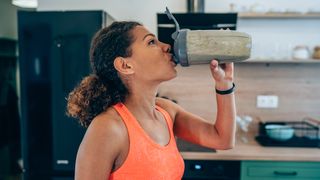
Avoid nutrient deficiencies
Plant-based diets are very nutritious, but it’s almost impossible to obtain enough vitamin B12 without resorting to supplements. But that’s not the only nutrient that may be in short supply on a vegan diet. It’s also worth remembering that if you train a lot, your nutritional requirements are way higher than those of an average person. Being a vegan athlete, you may struggle to get sufficient amounts of certain nutrients with food alone.
According to a review in the Journal of the International Society of Sport Nutrition, vegans who engage in high levels of physical activity may experience vitamin B12, iron, zinc, calcium, iodine and vitamin D deficiencies. They may also find it difficult to get enough omega-3 fatty acids EPA and DHA, as they are found predominantly in fish.
“While it is true that a meat-based diet has adequate amounts of iron, B vitamins, calcium and zinc, all of which help your body to stay healthy and recover from exercise, it is a myth that these requirements cannot be met with a vegan diet,” says Holmes. “All you need to do is to pay a little extra attention to where these nutrients are coming from and include a wide variety of these foods in your diet. Excellent plant sources of B vitamins include nutritional yeast, tahini, wheat germ, peanut butter, flaxseeds, legumes, beans, nuts and seeds.
“Important sources of zinc can be found in fortified breakfast cereals, pumpkin and sunflower seeds, tahini, pine nuts, and cashews. Pairing iron foods with vitamin C rich foods, such as lemon with lentils, or dark chocolate with strawberries, can remarkably improve the absorption of iron in vegans. Fortunately, there are many good quality supplements that are suitable for vegans too.”
Consider creatine and β-alanine supplements
Many professional athletes rely on a wide range of legal performance-enhancing supplements to get the best results possible. A review in the Journal of the International Society of Sport Nutrition reported that vegans could particularly benefit from creatine and β-alanine supplementation.

Creatine can help to increase muscle mass and strength, while beta-alanine aids in the production of carnosine – a compound that increases muscle endurance during high-intensity exercise. Since plant-based diets promote lower muscle creatine and lower muscle carnosine levels, adding these supplements could make a big difference to your sports performance.
This article is for informational purposes only and is not meant to offer medical advice.
Sign up for the Live Science daily newsletter now
Get the world’s most fascinating discoveries delivered straight to your inbox.

Anna Gora is a health writer at Live Science, having previously worked across Coach, Fit&Well, T3, TechRadar and Tom's Guide. She is a certified personal trainer, nutritionist and health coach with nearly 10 years of professional experience. Anna holds a Bachelor's degree in Nutrition from the Warsaw University of Life Sciences, a Master’s degree in Nutrition, Physical Activity & Public Health from the University of Bristol, as well as various health coaching certificates. She is passionate about empowering people to live a healthy lifestyle and promoting the benefits of a plant-based diet.
